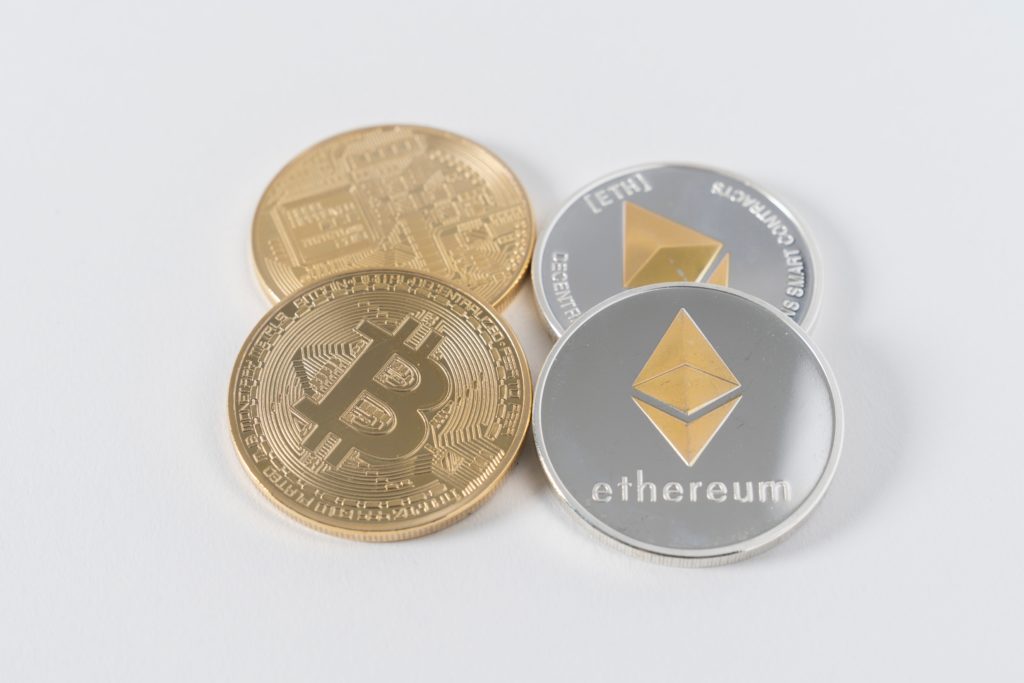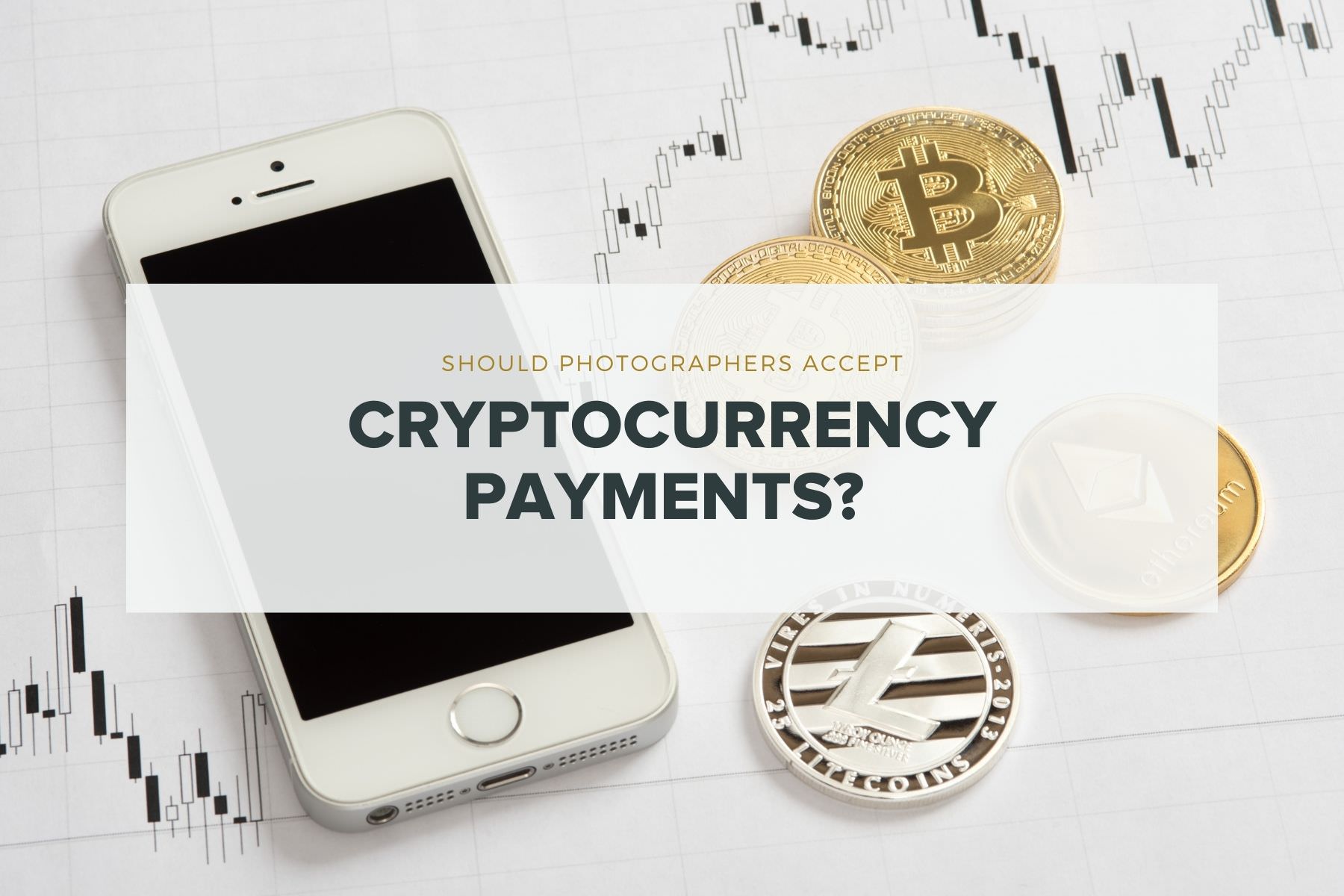Should Photographers Accept Cryptocurrency as Payment?
This year I started to learn about Bitcoin and Altcoins, and just for fun invest a bit of my savings into some cryptocurrencies. I’ve also seen an increasing number of photographers ask for advice in Facebook groups and other online communities after clients asking if they’ll take payment in Bitcoin. I found it really interesting how varied the responses were in these forums, so I thought I’d bring the conversation here to the blog and look at the pros and cons to decide whether photographers should consider accepting cryptocurrency as payment for their services.
Disclaimer – I’m not a financial adviser or expert in cryptocurrencies. This article is purely written from my own personal experience having invested my own money in crypto. Cryptocurrencies & investments come with financial risks and you should do your own research and get a full understanding of the risks before buying or accepting cryptocurrency payments.

What Is Cryptocurrency?
Very simply, cryptocurrency (or crypto for short) is a form of digital currency. Rather than being regulated by a centralised financial authority, cryptocurrency transactions are verified and regulated using decentralised networks. Cryptocurrencies rely on cryptography to prevent things like double-spending and fraud.
Different Types of Cryptocurrency
Bitcoin
The original cryptocurrency, and the one that most people have heard of today is Bitcoin (BTC). Bitcoin is the leading cryptocurrency and in 2021, it current holds the highest market value of all cryptocurrencies.
Altcoins
You might have heard about some other cryptocurrencies out there, such as Ethereum, Litecoin or Dogecoin. These are known as ‘Altcoins’ (as in alternative coins to Bitcoin). Accoring to Investopedia, in early 2020 there were over 5000 of these other cryptocurrencies out there as an alternative to Bitcoin. These altcoins are often developed as a response to solving a problem in the original Bitcoin
Is Crypto Real Money?
When photographers were asking in groups if they should consider accepting Bitcoin and other cryptocurrencies as payments, the reactions were so mixed. Responses ranged from “HELL YES” to, “If you accept Bitcoin you might as well also accept Amazon gift cards too” while one commenter said “Why not also consider accepting Monopoly money?!”
It’s clear that while some people now recognise crypto as a valid form of currency, others are still very sceptical. But it is real money? Yes, and no. It’s digital money. There are some place where you can buy things online (including Tesla now accepting Bitcoin), or if you want actual cash, you’ll most likely need to exchange it back to your a fiat currency and request a withdrawal from your crypto account to your bank account.

The Benefits of Cryptocurrency
Cryptocurrencies allow transactions to take place without the high costs of exchanging money between currencies, and paying service charges and fees to banks. Some transactions do charge a “gas fee” but the amount is usually minimal in comparison to what you’d pay in fees to banks and traditional payment services like PayPal or Stripe.
The other big carrot in front of many people’s noses when it comes to crypto is how the value has increased over the last few years.
When Bitcoin first started trading in 2010, you could buy 1 Bitcoin for US$0.0008. In March 2021, the current market price for a 1 Bitcoin is over $50,000.
2020 saw a huge growth in the crypto market, with almost all coins increasing in value over the course of the year.
The Risks Cryptocurrency
When it comes to deciding whether you want to accept cryptocurrency payments, it might be tempting when you look at how the value of Bitcoin and many altcoins has increased over the last few years. But there are some huge risks with cryptocurrency.
No Financial Regulation
Mainstream (fiat) currencies are regulated by governments and financial institutions, which means when you keep your money in a bank, you should have some levels of financial protection. Cryptocurrencies, on the other hand, are not financially regulated. If you have your cryptocurrency stored in a digital wallet, and that company goes out of business or is subject to a cyber attack, your money is not protected.
No Recovering Lost Funds
How could you lose your crypto? There are two main ways to start your crypto. Either in a “hot” wallet which is linked to online services that allow you to access, buy and sell your crypto fast and easily. For people who only hold a relatively small amount of crypto, these are preferable. Then there’s the “cold” wallet which are forms of offline storage, generally used for large amounts of crypto.
While “hot wallets” will be setup with a high level of security, much like your internet banking, they are not immune to cyber attacks. In 2019 a crypto exchange in Japan was hacked, leading to $32m in digital currencies going missing.
“Cold wallets” are the safer option. But there is still a catch. Lose your hard drive or forget the password and your money is gone.
Learn more about Bitcoin storage

Highly Volatile Market
The value of cryptocurrencies changes hourly. So the $2000 retainer that someone pays you in crypto could be worth much more or much less within hours of you receiving that money in your crypto wallet. Obviously it’s great if it’s worth more, but that may have additional tax implications. If it’s worth less, well that just sucks. You could wait to see if its value goes up again. But you also risk the value decreasing more. While the value of most of them seems to be currently trending upwards, the markets have crashed before, and they could again. Which could leave you with nothing.
Do You Need To Pay Taxes on Crypto Payments?
I’m not an accountant or a financial advisor, so I can’t tell you what tax implications accepting crypto will have on your business. Many countries are still trying to work out exactly how to deal with them. And while cryptocurrencies themselves may not be recognised as legal tender by many financial institutions at this time, the profit made from liquidating them, value of assets held and interest made may well be taxable.
Any payment you accept payment for services in your photography business, whether that’s cash, credit card, or wire transfer of your native Fiat currency or cryptocurrency, needs to be accounted for. Not reporting income of any kind is tax fraud.
You may need to have a conversation with your tax advisor about how you are going to invoice for a crypto payment (i.e. in which currency) and what tax implications that could have too. Then there is whether you then decide to keep your cryptocurrency in a crypto wallet and see if it’s value increases (in which case you may need to pay additional capital gains tax) or withdraw it for your fiat currency market value at that time.

I’ll be completely honest and say that I find it pretty challenging monitoring the value of the assets of even the small amount of crypto that I hold. That is why I use a dedicated crypto accounting app called Accointing that links to my crypto exchanges and wallets and can export a financial report that I can send directly to my tax advisor when it’s time to do my tax return. I chose Accointing specifically as it’s approved for the Austria as well as the UK, USA, Germany and Switzerland.
Click here for information on how to file a crypto tax report and use this link to try Accointing for free and get a 10% discount when you sign up for a paid plan.

Do I Think Photographers Should Accept Cryptocurrency As Payment?
I can’t speak for anyone else but myself. I do own a number of cryptocurrency assets, but I’ve seen how volatile the market is. Some days my crypto is worth more than what I purchased it for. Other days it’s worth dramatically less. Right now I can afford to leave wait and hope it increases in value. But that’s a small amount of my own personal savings. Not business cashflow that I need for the day-to-day running of my business.
Before you even consider accepting Bitcoin or any other form of cryptocurrency, you need to make sure that you fully understand how crypto works and the potential risks and challenges involved.
Personally, I don’t yet feel comfortable accepting cryptocurrency as payment option for my elopement photography business. Perhaps a little further down the line when I understand more about the tax implications of using it as a payment source and as the market becomes more stable, I might consider it.
But right now I think the market is still too volatile, especially with some big developments happening with Ethereum 2.0. While many experts are predicting that crypto will continue to rise in value, there are also some predicting crashes. I want to know that I’ll get paid the price that I am charging, and not risk having my income reduced if a client pays in crypto and the market value of that currency crashes shortly after. I also don’t want to have client payments sitting in crypto accounts right now on the hope they will increase in value. I’d rather take the money that I’m owed now, pay my bills and pay myself a better salary. You never know. I might even end up investing some of that money back into cryptocurrencies!
What do you think? Would you, or have you accepted cryptocurrency as payment for your photography services? Let me know in the comments below.
Crypto wallets I use:
Trust Wallet
Coinbase Wallet













Hello,
thank you for for writing an article that may be more and more relevant as cryptocurrencies get wider adoption.
My position here is slighly different from yours in the meanign that I’d separate the decision between holding Bitcoin or other cryptocurrencies and accepting them as a payment method.
Should I client prefer to pay with Bitcoin I’d be happy to provide this as part of my services and then to avoid the risks of fluctuations I would convert the amount in my currency ASAP.
Commisions are not so far from those needed for accepting credit card payments.